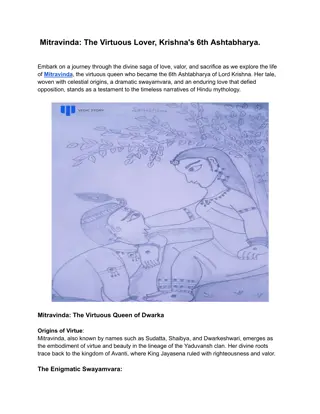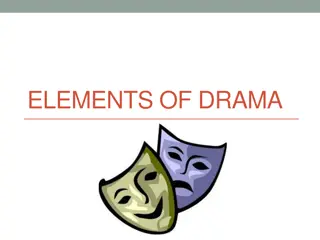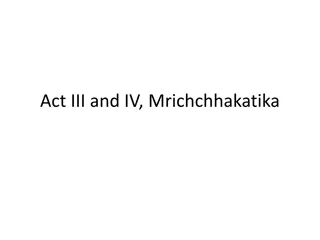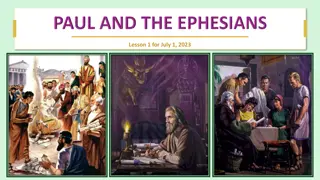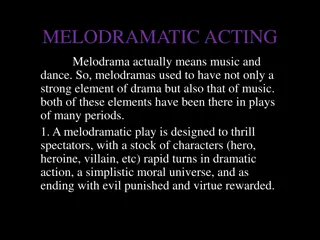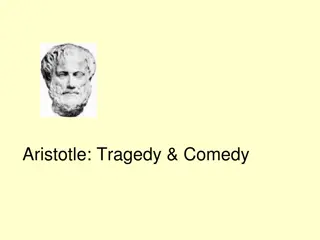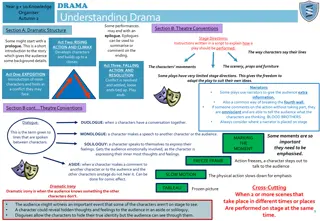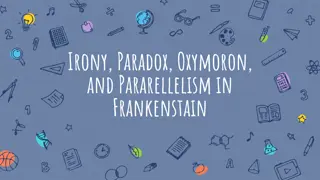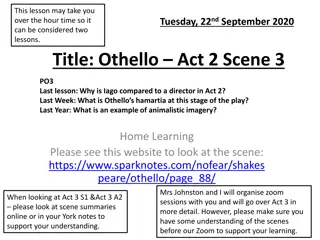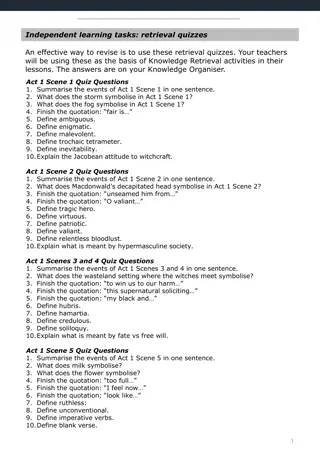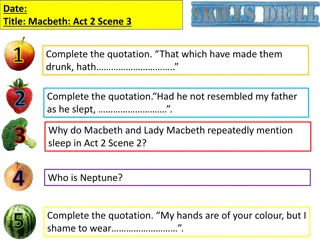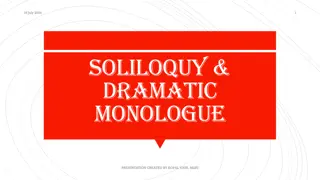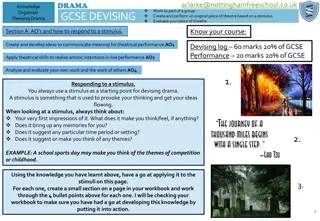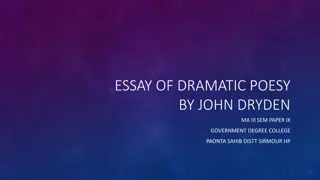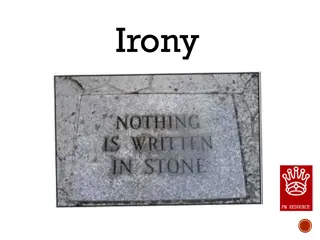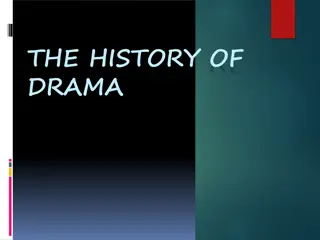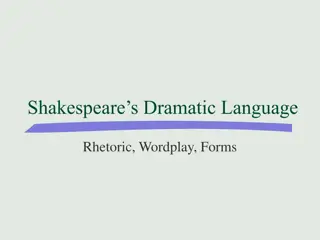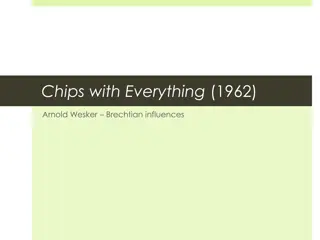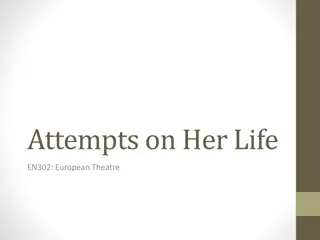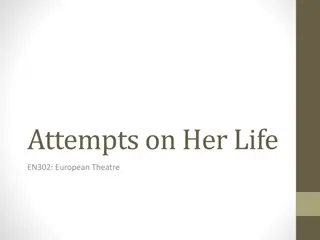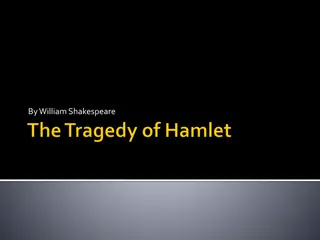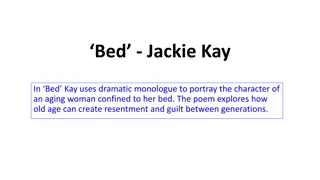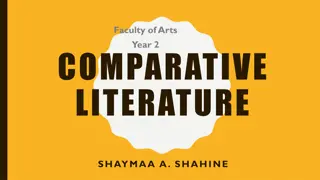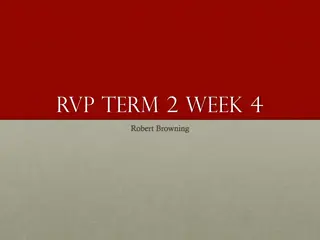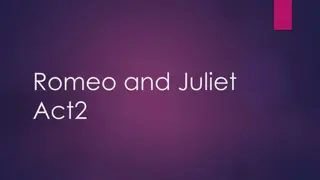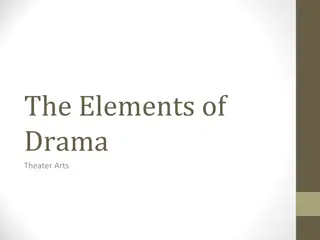Upgrade Your Home Décor with Dramatic Patterns
Try to avoid getting too crazy when using pattern in your home d\u00e9cor and instead strive for a more subtle look. Indeed, it is true! The popularity of patterns has increased due in part to the creative ways that they may be used to create stunning home d\u00e9cor.
0 views • 2 slides
Mitravinda_ The Virtuous Lover, Krishna's 6th Ashtabharya.
Mitravinda: The Virtuous Lover, Krishna's 6th Ashtabharya.\n\n\nEmbark on a journey through the divine saga of love, valor, and sacrifice as we explore the life of Mitravinda, the virtuous queen who became the 6th Ashtabharya of Lord Krishna. Her tale, woven with celestial origins, a dramatic swayam
0 views • 3 slides
Understanding the Elements of Drama and Theater History
Drama, originating from the Greek verb "dran," involves acting and storytelling in front of an audience. Explore the key aspects, from the Globe Theater in London to dramatic structure, actors, and speech forms like dialogue and monologue. Learn about the crucial components such as playwrights, acto
3 views • 22 slides
iS Clinical Skin Care Products, dermsilk.com
Their solution are made of traditional plant medicine and advanced formulations to give clinically validated dramatic results. Get them now from DermSilk. \/\/tinyurl.com\/usd929nh
1 views • 11 slides
Intrigue and Rebellion in Mrichchhakatika
The play "Mrichchhakatika" unfolds a tale of love, betrayal, and societal norms through its main plot involving Charudatta and Vasantasena, as well as a subplot featuring Madanika and Sharvilaka. Acts III and IV depict the making of a breach as characters navigate themes of freedom, theft, and defia
0 views • 7 slides
The Impact of Paul's Preaching in Ephesus
Paul's significant presence and teachings in Ephesus led to a deep spiritual transformation among the Ephesians, sparking reactions that showcased the power of Jesus over evil forces. The city became a focal point of intense spiritual battles and transformation, culminating in the dramatic burning o
2 views • 14 slides
5 Must-Have Features for Your Ecommerce Mobile App
Developing robust mobile apps can have a dramatic impact on a retailer\u2019s business if they are equipped with the right capabilities \u2013 leading to higher engagement and loyalty while retaining or improving the revenue, and greatly reducing the costs. But always keep the needs of your users in
1 views • 5 slides
The Magic of Ireland’s Wild Atlantic Way Beach Hotel Ireland
Ireland\u2019s coastline is a tapestry woven with dramatic cliffs, hidden coves, and endless stretches of pristine sand. For those seeking an unforgettable beach vacation in Beach Hotel in Ireland, Dolphin Beach, a captivating beach accommodation Ireland nestled along the Wild Atlantic Way, offers t
2 views • 4 slides
Bali Indonesia Trip Embrace Tropical Bliss
Dive into the allure of Bali Indonesia trip with our exclusive tour package. Immerse yourself in the exotic beauty of Seminyak's vibrant beaches, Uluwatu's dramatic cliffs, the pristine landscapes of Nusa Penida, and the cultural heart of Ubud. To learn more , visit \/\/wanderon.in\/trip\/seminyak-a
3 views • 1 slides
iS Clinical Skin Care Products, dermsilk
Their solution are made of traditional plant medicine and advanced formulations to give clinically validated dramatic results. \/\/rb.gy\/3i6g43
1 views • 10 slides
CDC Warns of Mosquito | healthcare
The Centers for Disease Control and Prevention (CDC) has issued a new warning about a dramatic increase in dengue virus infections, with a \u201crecord-breaking number\u201d of cases reported across the Americas
0 views • 2 slides
Understanding Melodramatic Acting in Theatre
Melodramatic acting in theatre combines elements of drama, music, and spectacle to create thrilling performances for audiences. These plays feature stock characters, rapid dramatic action, and a simplistic moral universe where good triumphs over evil. Actors in melodramas must master melodramatic sp
0 views • 7 slides
Overview of Poetry Genres and Elements for English Students
Explore different genres of poetry including narrative, epic, dramatic, satirical, elegy, fable, and prose poetry. Delve into the unique elements of poetry such as diction and figurative devices like simile and metaphor. Engage with various examples from renowned poets and learn about the aesthetic
1 views • 25 slides
Aristotle's The Poetics: Tragedy and Comedy Analysis
Aristotle, the Greek philosopher, introduced key concepts in his work The Poetics, focusing on tragedy and comedy. He countered Plato's views on literature and emphasized the importance of imitation, catharsis, and the unity of time, place, and action in dramatic composition.
0 views • 32 slides
Theater Conventions and Characterization in Drama
Theater conventions such as prologues, epilogues, dialogues, monologues, and dramatic structure like exposition, rising action, climax, falling action, and resolution are explored in drama. Additionally, the importance of character creation through techniques like backstories, flashbacks, and flashf
0 views • 4 slides
Irony, Paradox, Oxymoron, and Parallelism in Frankenstein
Exploring the concepts of irony, paradox, oxymoron, and parallelism in Mary Shelley's "Frankenstein." The discussion covers different types of irony such as situational, verbal, and dramatic, highlighting instances from the novel. Additionally, the concept of paradox is examined, showcasing statemen
0 views • 16 slides
Analyzing Iago's Manipulation in Othello Act 2 Scene 3
Explore the intricate dynamics between Iago and Cassio in Act 2 Scene 3 of Othello. Dive into the themes of manipulation, loyalty, and deception as Iago orchestrates his plans while examining Cassio's susceptibility to Iago's ploys. Uncover the layers of dramatic irony, thematic contrasts, and chara
0 views • 8 slides
Macbeth Quiz: Act Summaries, Symbolism, and Definitions
Explore a series of retrieval quizzes focusing on key scenes from Shakespeare's Macbeth, delving into events, symbols, quotations, and definitions related to the play's themes. Dive into Act 1 to Act 3, analyzing character motivations, symbolic elements, and thematic concepts that shape the dramatic
0 views • 4 slides
Discovering the Porter in Macbeth's Act 2 Scene 3
Act 2 Scene 3 of Macbeth features the Porter's comedic interlude, providing relief from the tense atmosphere following Duncan's murder. The Porter's dialogue, filled with humorous references and wordplay, adds a layer of complexity to the play's themes. This scene contributes to building suspense an
2 views • 9 slides
Understanding Soliloquy and Dramatic Monologue in Literature
A soliloquy is a form of monologue where a character speaks to themselves, the audience, or a surrogate, revealing inner thoughts. This presentation explores different types of soliloquies and their significance in literary works, including examples from Shakespeare's Hamlet. Additionally, it delves
0 views • 9 slides
Devising Drama - GCSE Knowledge Organiser
This GCSE Drama Knowledge Organiser provides guidance on devising and performing an original piece of theatre based on a stimulus. It covers how to respond to stimuli, develop ideas for theatrical performances, apply theatrical skills, analyze and evaluate work, and rehearse and refine the devised p
0 views • 10 slides
Debate on Dramatic Poesy by John Dryden
John Dryden's work "Essay of Dramatic Poesy" is a dialogue among four speakers that debates the merit of classical versus modern drama, the comparison between French and English drama, and the use of rhyme in plays. Each speaker presents arguments showcasing their perspectives on these topics, revea
0 views • 5 slides
Understanding Irony in Verbal, Dramatic, and Situational Contexts
Explore the nuances of verbal, dramatic, and situational irony through examples and explanations. Verbal irony involves saying something different from what is meant, often using humor like puns. Dramatic irony occurs when the audience knows something the characters don't, creating suspense. Situati
0 views • 12 slides
The Art of Dramatic Writing: Exploring Character Development and Dialectical Approach
Every object and human has multiple dimensions that influence character development in dramatic writing. Understanding the physiological, sociological, and psychological aspects, along with the impact of the environment and dialectical approach, shapes characters' growth and decisions in storytellin
0 views • 12 slides
Exploration of Various Poetry Forms: Descriptive, Narrative, Dramatic, and Metaphysical
Poetry is a diverse art form encompassing descriptive portrayal, storytelling narratives, engaging dialogues, and profound metaphysical insights. Descriptive poetry vividly captures objects and scenes like paintings, narrative poetry weaves interconnected stories, dramatic poetry involves dialogues,
0 views • 11 slides
The Evolution of Drama: A Historical Journey
Drama, originating from ancient Greece, has evolved through the centuries from being a genre of poetry to a distinct theatrical form encompassing tragedy, comedy, and more. The masks of Thalia and Melpomene symbolize the essence of comedy and tragedy, while the Great Dionysia festival in Athens hono
0 views • 41 slides
Understanding Dramatic Monologue in Poetry through "Havisham
Dramatic monologue in poetry is a form where a solitary speaker addresses an audience, offering insight into a character's thoughts and emotions. This exploration often reveals complexities, conflicting viewpoints, and hidden truths. Through examining the character of Miss Havisham from Charles Dick
1 views • 43 slides
Exploring Shakespeare's Dramatic Language and Themes
Shakespeare's dramatic language entails rhetoric, wordplay, and rich forms that offer both pleasure and challenges to readers. His verse showcases density and richness, with characters expressing thoughts through powerful metaphors and figurative language. Examples from "Macbeth" illustrate how imag
0 views • 40 slides
Understanding Irony: Verbal, Dramatic, and Situational Examples
Dive into the world of irony with examples of verbal, dramatic, and situational irony explained through scenarios like sarcastic comments, horror movie twists, and unexpected encounters. Explore how irony adds layers of meaning and depth to storytelling, from characters knowing more than others to o
0 views • 10 slides
Epic Theatre and Brechtian Influences in Modern Drama
Epic theatre, influenced by Bertolt Brecht, challenges traditional Aristotelian and Hegelian dramatic structures by emphasizing critical engagement and distancing strategies. It uses historical narratives and didactic elements to provoke social consciousness and active spectator participation, contr
0 views • 26 slides
Exploring European Theatre Traditions
European theatre traditions, as discussed through Lehmann's Postdramatic Theatre and Aristotle's dramatic elements, highlight the unique characteristics that differentiate them from non-European traditions. Concepts such as hamartia, anagnorisis, and mimesis are explored along with the rejection of
0 views • 30 slides
European Theatre: Exploring Dramatic Elements and Themes
European theatre has a rich history and tradition that distinguishes it from other global theatre practices. From Aristotle's dramatic elements to the conflicts faced by characters like Antigone and Creon, this form of theater delves into themes of recognition, imitation, and conflict. Hans-Thies Le
0 views • 35 slides
Shakespearean Dramatic Techniques Analysis
Explore the intricate use of monologues, soliloquies, structural divisions, and emotional responses in William Shakespeare's plays. Delve into the dialogues between characters like Hamlet, Gertrude, and Claudius to uncover themes of love, madness, and expectation. Discover how Shakespeare utilizes d
0 views • 23 slides
Analysis of "Bed" by Jackie Kay: Themes, Form, and Use of Scots
Bed" by Jackie Kay is a dramatic monologue portraying the perspective of an elderly woman confined to her bed, exploring themes of aging, resentment, and guilt between generations. The poem uses Scots to add immediacy to the narrative, highlighting the woman's reliance on her daughter and contemplat
1 views • 34 slides
Exploring Character Creation and Dramatic Conventions in Drama Class
Using a short piece of text as a stimulus, students in a drama class dive into creating characters and exploring dramatic conventions to craft scenes depicting different aspects of their characters' lives. The story unfolds in Hell's Alley, where tension and conflict shape the protagonist's experien
0 views • 10 slides
Exploring Dramatic Forms: From Burlesque to Well-Made Plays
Dive into the world of dramatic forms, where Burlesque emerged in Medieval Drama and was revived in the Seventeenth Century to satirize serious works. Learn about high burlesque that parodies literary works like Alexander Pope's "The Rape of the Lock" and low burlesque that mocks serious subjects. D
0 views • 9 slides
Analysis of Robert Browning's Dramatic Monologues and Implied Audience
In this content, we delve into the elements found in the dramatic monologues of Robert Browning, focusing on implied addressees, ideal recipients, and the implications of the dramatic form on the relationship between speaker, addressee, and reader. We explore how the presence of an implied audience
0 views • 5 slides
Analysis of Literary Devices in Romeo and Juliet Act 2
In Act 2 of Romeo and Juliet, the characters use various literary devices such as allusion, dramatic irony, hyperbole, and foreshadowing. Mercutio mistakenly believes Romeo is still in love with Rosaline, showcasing dramatic irony. Additionally, Friar Lawrence's words foreshadow the danger in Romeo
0 views • 10 slides
Understanding Irony: Types, Purpose, and Examples
Irony is about expectations and contrast between reality and what is being said. It can add interest, depth, suspense, and humor to texts. The three types of irony are verbal, dramatic, and situational, each serving a unique purpose to engage the audience. Examples from popular stories like Beauty a
0 views • 12 slides
Understanding Drama: The Art of Theater Expression
Drama, originating from the Greek word "Dran" meaning to act, is a form of storytelling performed in front of an audience. It differs from prose and poetry by providing a unique experiential aspect through live enactments. Essential elements such as playwrights, actors, acts, scenes, and dramatic sp
0 views • 15 slides

